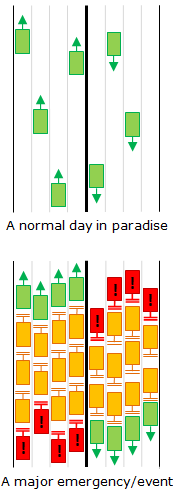Is VoIP the way forward?

Instead of writing about something in the world or sparking controversy, I thought I'd open this one up as a simple, easy rolling discussion.

Take one example. When the World Trade Centre came down, so did many of the telephone networks transmitters; also with that, the panic effect made everybody want to ring each other, saturating the phone networks. This is something that we (at my 'ordinary day job') call the "9/11 effect". When (justified) mass panic ensues, everybody tries to call everybody else and brings the phone network to a standstill - because the phone network is like a motorway/highway. There's a finite amount of space and if too many people use it, it becomes slow and eventually stops.
VoIP in theory is the same except can be easily increased. With a physical phone network, you have to add more exchanges, add more physical technology, expand the phone lines, add more transmitters - it's a costly and lengthy process. With VoIP, bang in a few more routers, some cables, another server, and that'll usually do it. VoIP seems to be generally less costly, and expanding the VoIP network is probably a lot easier than the physical phone lines.
Considering we all talk to each other every day, having a scalable and expandable phone system to keep in touch is essential for modern day culture. However, VoIP isn't perfect. The backend architecture can take a while to perfect, you rely on having an Internet connection, and it's essentially Skype on your phone.
VoIP would mean better integration with web services we already have - Windows Live Messenger, Google Talk and Skype for communication, but also it'd allow us to dial landlines and mobiles/cell phones without any major complicating devices in between. However, I have thought of a potential problem.
Already with on-demand television, the video web and the mass of data already flowing around the Internet, could a total unified VoIP network replacing any copper landlines we have now slowly cripple the web? Although I can't find the link to the page anywhere, the mass influx of people downloading Vista Beta 2/RC1 nearly brought down the Web, because so many people were downloading, it slowed the entire worldwide network down for days.
Is VoIP that important? Do we need to evolve our communications network for the near-future and beyond? What good/bad could come out of it? Is VoIP currently an essential business tool or a useful gimmick for the poor student?
No bitchy comments, no hostilities please. What do you think? What do you want? Talkback.